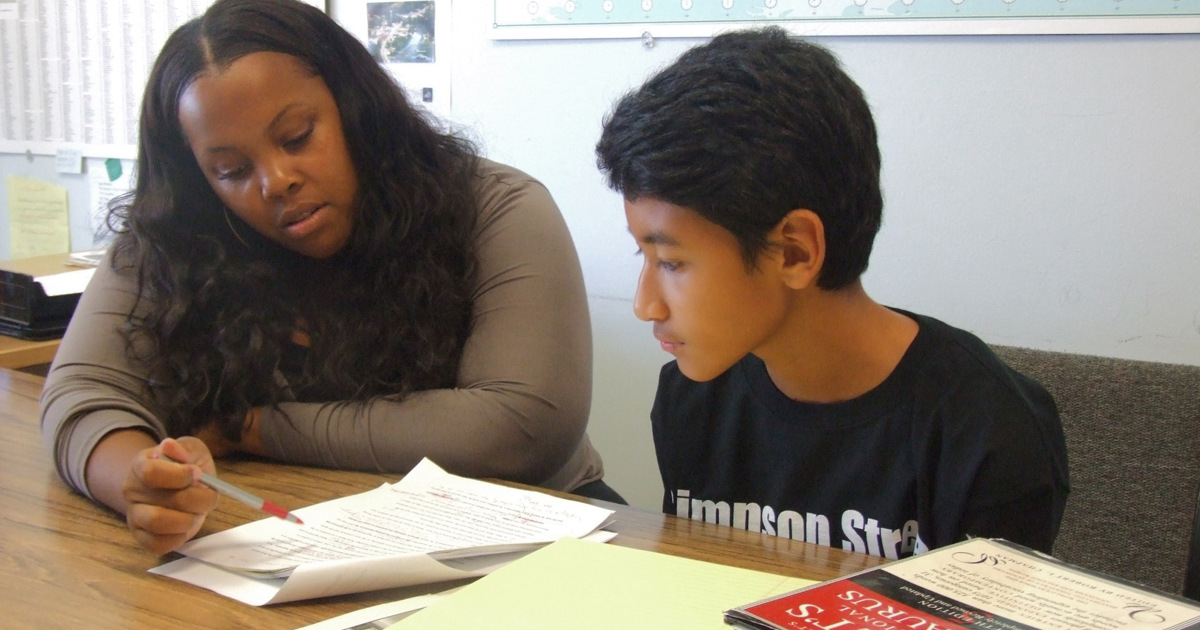The program operates as a student-run newspaper, where students determine which topics to investigate, work together to develop articles and review and revise article drafts.
Executive Director James Kramer offers an inside look at his program's work.
How many E language learner students does La Prensa Libre de Simpson Street serve, and from what backgrounds?
About 165 Simpson Street Free Press student reporters are ELL students and/or enrolled in Dual Language Immersion programs at school.
What specific challenges do your ELL students face?
"After-school and summer learning programs can help ELL students negotiate the complicated task of keeping up with grade-level academic content while concurrently developing their English proficiency, thus reducing the gaps in academic achievement between ELLs and their native English-speaking peers." – Lisa Pray, Supporting English Language Learners Afterschool and Summer
We follow modern research in the OST field, and we know that time set aside for one-on-one close reading and reading for pleasure is limited during the school day. That's where OST programs come in. Afterschool and summer programs that focus on writing and literacy can have tremendous impact, in particular for ELL students. We provide crucial literacy support and homework help. ELL students build writing and reading skills while simultaneously keeping up with grade level content.
How does La Prensa's project-based approach help students develop literacy skills?
Writing for publication is project-based learning. So is running a small business. Ideas drive our business. Students learn to innovate, write well and publish on multiple platforms. Our content and coverage have to be interesting—we want young readers to be inspired. La Prensa students improve reading proficiency and overall school performance because they want to publish quality articles. The tools and structure in place at La Prensa support students throughout the publishing process. They learn the ropes and move up the newsroom ranks.
La Prensa's newsroom is student-run. What roles do your staff members play, and how do you foster autonomy in students?
La Prensa students read and write extensively. They steward their research/writing assignments through several rounds of revision, fact-checking and editing. We refer to this process as the "production pipeline." Throughout the newsroom production process, editors (and older students) assist the young writers. We use peer review and one-on-one writing conferences with editors to increase close reading opportunities and close reading dosage. This newsroom process (or structure) builds autonomy among our students. They learn to use the newsroom systems to finish their articles and see them published. Students learn to revise their own work, and the work of others. They learn methods and strategies that are easily transferred to the classroom. "Gradual Release of Responsibility" is a key strategy at SSFP.
In what ways do you encourage bilingualism in your program?
Many ways. First and foremost, we encourage students to understand that reading and writing (in any language) builds literacy. We encourage a lifelong love of reading and learning. Our newsrooms encourage exploration through reading and research. Any new dinosaur discovery, Mars space probe, or local art gallery is a lesson plan for us. Our methods inspire curiosity.
Students work across languages and across the curriculum. They often translate each other's work. A student can write an article in Spanish, then work with peers to translate the piece into English—and then publish it, complete with photos. Our students often publish in English using sources written in Spanish. This process, of course, can work the other way, too. La Prensa students are constantly reading, writing, editing and assisting peers. Working across languages builds literacy skills and fosters teamwork. Exploration fosters curiosity and academic confidence.
What does it mean for your program to be recognized by the Dollar General Literacy Foundation? How will this help your program?
It means the world to us. We have watched the work of the Afterschool Alliance for many years. We follow much of the same research in the OST field. Achievement gaps in Wisconsin are among the worst in the nation, and almost half of students in local schools are ELL learners. Our goal is to confront these disparities with cutting-edge literacy curriculum specifically designed for OST. La Prensa supports the school day, but does not replicate the classroom. Recognition from Afterschool Alliance and Dollar General affirms our focus on literacy and project-based learning. We are grateful, and anxious to continue our partnership. We are proud of our results.
Courtesy of La Prensa Libre de Simpson Street.




